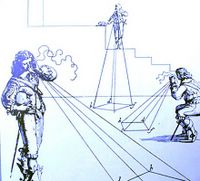
We need new perspectives on education!

Years ago, in the 60s, John Holt wrote two great books called ‘How Children Fail’ and ‘How Children Learn’. Holt began as a writer who thought education could be changed but eventfully he gave up on the school system. Another book written at the same time was called ‘Compulsory Mis-education’ which sums up the feeling of the hopelessness of changing traditional schooling. They are still great books.
So what has changed? Schools currently fail more students than ever. Even the highly explicit imposed ‘best practice’ literacy programmes, after initial success, run out of steam turning teachers into dependent clones in the process.
What we now need are new books called ‘How Schools Fail’ and ‘How Schools Learn’. We need to look at the ‘big picture’ of education and stop patching up bits. We need to develop some new perspectives to put into practice; the fragmented factory approach never really worked when it was established and it sure doesn’t work now.
Today too many secondary schools, the area where the organizational flaws of the fragmented factory mentality are still firmly in place, just go through the motions! Such schools, steeped in tradition, are in dire need of reform and the problems are particularly acute in low poverty areas. Students learning experiences are disconnected and often irrelevant and as a result persuasive student boredom, alienation and strained relationships are the norm.
According to educator Roland Barth, ‘many of our schools seem en route to becoming a hybrid of a nineteenth century factory, a twentieth century minimal security penal colony, and a twenty first century Education Testing Service’.
Something has to be done but so far imposed current reforms are notable for their lack of success.
There are exciting possibilities for those who can give up their attachment to the past. There are schools doing their best to personalize learning by helping each student ‘one at a time’ such as the ‘Big Picture Schools’. Unfortunately too many of our current schools are so mired in traditions, or trying to put into practice badly thought out imposed curriculums, to see past their noses. The exciting developments in teaching and learning have difficulty breaking through the thick walls of habit that surround traditional schools.
The late educationalist Paulo Freire published his first book ‘Pedagogy of the Oppressed’ in 1970 and his last, called ‘Pedagogy of Indignation’, in 2004. Largely ignored by traditional educators, Paulo saw education as a means to empower learners to change and transform education and believed in the decentralization of power in all areas. The whole concept of imposed power has been largely ignored in schools who always presume to know best for their students. Freire however did not see education as neutral. He was angry about how education was being misused and how it was not really facing up to injustice and poverty in students lives. As such he was known as a ‘liberation educationalist’ - encouraging his students to challenge traditional powers. He believed you need to denounce the current inequalities and then get involved in positive social responses. He was about student rights and the need for students to struggle to achieve their dreams. Dreams, envisioning change, and struggling for liberation were Freire’s strategies; refusing to summit to current structures which endlessly reproduces themselves. Freire wrote, ‘Tomorrow is neither a necessary repetition of today, as the dominant would like it to be, nor something predetermined. Tomorrow is a possibility we need to work, and, one we must fight to build.’
There is a better world but the past will not surrender without a fight!
Schools will never change until some of the idea about power and poverty are shared by those in schools. School transformation could be the first step in social transformation.
Schools need to engage with students, teachers need to develop new roles and provide students with new perspectives and experiences, and in the process, empower them to act positively to enact changes.
Freire’s last words were, ‘I fight for a dream, for the utopia, for hope itself, in a critical pedagogical perspective. And that is not a vain struggle.’
3 comments:
Heavy stuff Bruce but right on target! Current secondary schools are simply irrelevant for too many students but the anxious middle class love it and will not give it up without a fight - it is, as you say, about protecting privelege and power!
Barth's quote deadly accurate but Freire's ideas would frighten - fancy really empowering students rather than just talking about it. Too much! It would mean practicing democracy and believing in freedom from oppression! Hardly secondary school qualities.
There were some great books on transforming education in the 60/70s - anything around these days?
Post a Comment